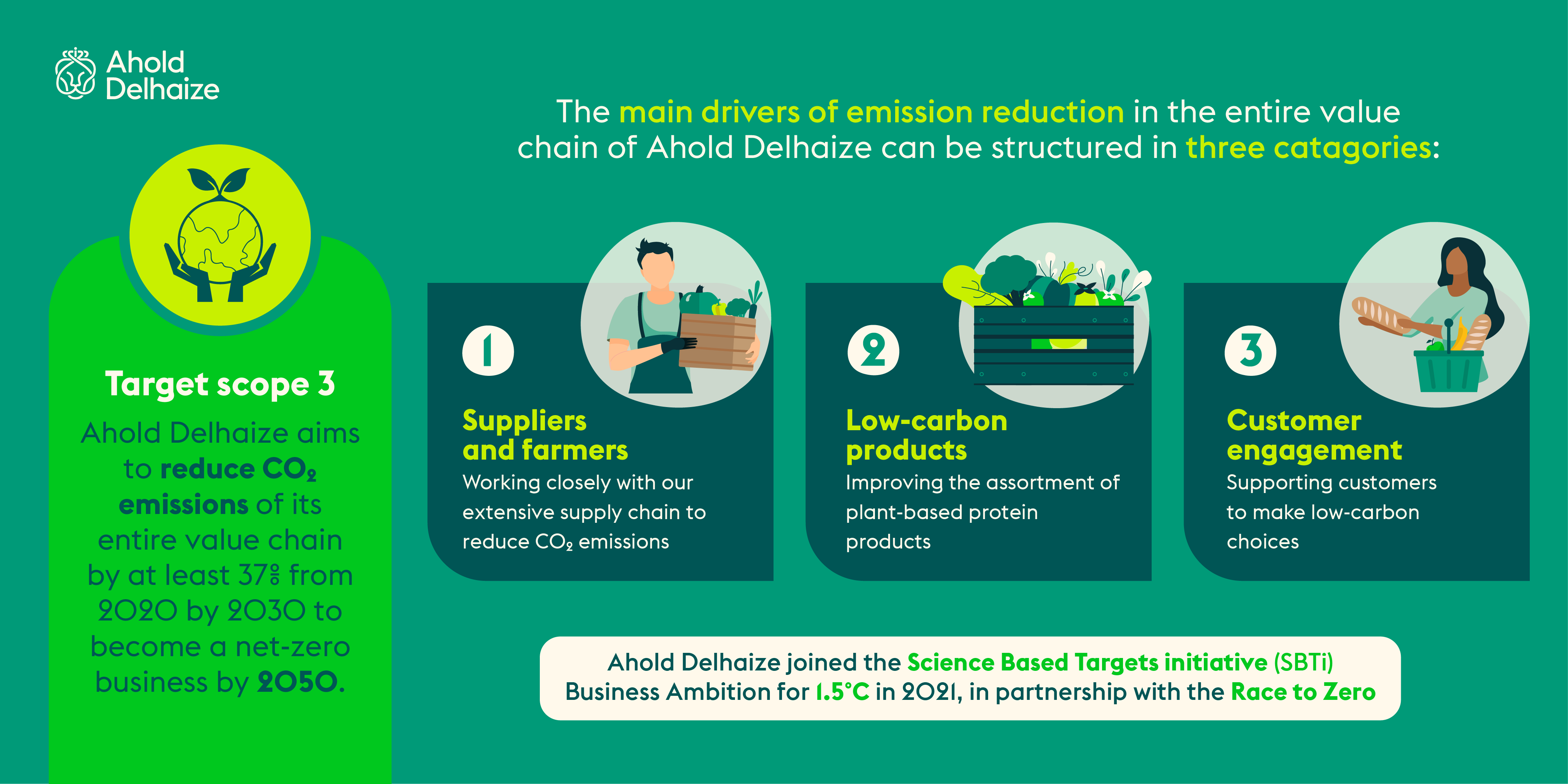Ahold Delhaize announces the update of its interim CO2 emissions reduction target for its entire value chain (scope 3) to at least 37% by 2030, and to become net-zero by 2050. For its own operations (scope 1 and 2), the company remains committed to become net-zero by 2040 with an interim target of a 50% reduction by 2030. With this updated scope 3 interim target, Ahold Delhaize aims to achieve the decarbonization of its entire value chain and ensures that all of its climate targets are in line with the UN’s goal of keeping global warming below 1.5°C.
The updated interim target is aligned with the Science Based Targets initiative’s Net-Zero Standard. In accordance with the recommendation by the Science Based Targets initiative, Ahold Delhaize is using its latest available emission profile from 2020 as baseline for its 37% 2030 reduction target, updated from a 2018 baseline before. In November 2021 the company joined the Business Ambition for 1.5°C, a global coalition of UN agencies, business and industry leaders, in partnership with the Science Based Targets initiative (SBTi) and the UN led campaign ‘Race to Zero’. The update today is part of the annual climate reporting cycle as per the Business Ambition agreements.
Decarbonization pathway
Whereas scopes 1 and 2 involve the CO2 emissions of Ahold Delhaize’s own operations (mainly consisting of energy, refrigeration systems, and owned and leased transport), scope 3 represents the indirect CO2 emissions across our entire value chain. This value chain consists of thousands of suppliers, producers and farmers who supply hundreds of thousands of products that are sold to millions of customers across the United States and Europe each day.
Jan Ernst de Groot, Chief Sustainability Officer of Ahold Delhaize: “As a group of mainstream supermarkets and retailers, we want to provide customers with sustainable and healthy products, while keeping shelf availability and affordability top of mind. Our commitment is to future generations, to continue to play a leading role in the transition to a more sustainable food system. We are proud of frontrunners like Albert Heijn, who inspire other brands within the Ahold Delhaize group – and the sector – to take sustainability performance to the next level in their market.”
The updated interim target is the result of extensive review, which started in November 2021 together with external experts. This review shows that the main drivers of emission reduction in scope 3 can be structured in three categories: suppliers and farmers, low-carbon products and customer engagement.

Suppliers and farmers
A key element of our decarbonization efforts is encouraging and supporting our suppliers in setting their own emission reduction targets in line with the latest scientific evidence, and signing up to the Science Based Targets initiative. These emission reduction commitments will accelerate improvements in livestock farming, raw material sourcing, deforestation reduction, processing, food waste reduction, packaging and transport. Our brands can contribute by supporting their suppliers and farmers with concrete environmental actions. They can do this, for example, by setting up long-term contracts with farmers.
Low-carbon products
Several of Ahold Delhaize’s brands continue to introduce more plant-based protein products in their assortments, driving the improvement of existing assortments and the development of new assortments with less embedded emissions. Our Dutch local brand Albert Heijn, for example, committed to achieve a distribution of 60% plant-based and 40% animal-based protein sales by 2030. All our brands in Europe will commit to baseline their current protein ratio and set protein ratio targets by the end of 2024.
Customer engagement
Helping customers understand the impact of their buying decisions and make choices that fit their needs, their tastes and their values is an important part of our approach. This includes stimulating and rewarding more sustainable choices through loyalty programs and discounts, increasing product transparency through navigation systems and product labelling, improving assortments with more vegan and vegetarian products, and increasing awareness and knowledge about a healthy lifestyle.



